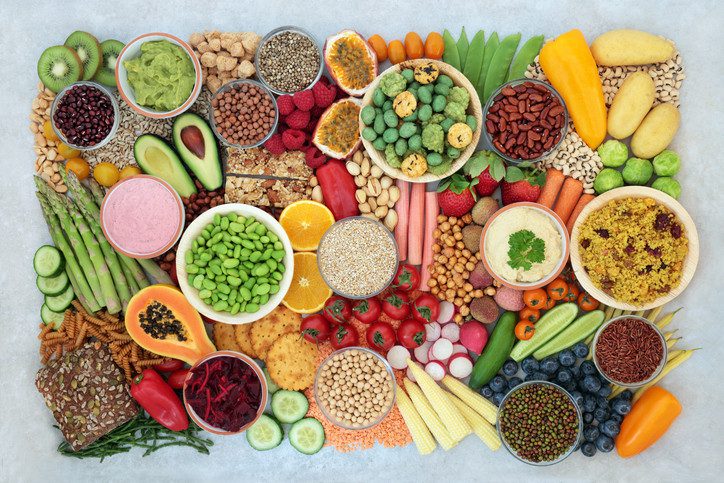I recently learned about a study suggesting a vegan diet is an effective treatment for rheumatoid arthritis.
While that sounded intriguing, another claim made in an interview about the study really caught my attention: the lead author of the study said that physicians should encourage people with rheumatoid arthritis to try changing their eating patterns before turning to medication.
Before turning to medication? Now wait just a minute. That flies in the face of decades of research convincingly demonstrating the importance of early medication treatment of rheumatoid arthritis to prevent permanent joint damage. An increasing number of effective treatments can do just that.
In fact, there’s no convincing evidence that changes in diet can prevent joint damage in rheumatoid arthritis. And that includes this new study.
So, what did this research find? Let’s take a look.
A vegan diet for rheumatoid arthritis
Researchers enrolled 44 people with rheumatoid arthritis in the study. All were women, mostly white and highly educated. They were randomly assigned to one of two groups for 16 weeks:
- Vegan diet. Participants followed a vegan diet for four weeks, followed by additional food restrictions that eliminated foods the researchers considered to be common arthritis trigger foods. These foods included gluten-containing grains (wheat, barley, and rye), white potatoes, sweet potatoes, chocolate, citrus fruits, nuts, onions, tomatoes, apples, bananas, coffee, alcohol, and table sugar. After week seven, these foods were reintroduced, one at a time. Any reintroduced food that seemed to cause pain or other symptoms of rheumatoid arthritis was eliminated for the rest of the 16-week period.
- Usual diet plus placebo. These participants followed their usual diet and took a placebo capsule each day for 16 weeks. The capsule contained insignificant doses of omega-3 fatty acids and vitamin E.
After the first 16 weeks, participants took four weeks off, then the groups swapped dietary assignments for an additional 16 weeks.
What did the study find about the vegan diet?
The vegan approach seemed to help lessen arthritis symptoms. Study participants reported improvement while on the vegan diet, but no improvement during the placebo phase.
For example, the average number of swollen joints fell from 7 to 3.3 in the vegan diet group, but actually increased (from 4.7 to 5) in the placebo group. In addition, while on the vegan diet, participants lost an average of 14 pounds, while those on the placebo gained nearly 2 pounds.
What else do we need to consider?
While the findings sound great, the study had significant limitations:
- Size. Only 44 study subjects enrolled and only 32 completed the study. With such small numbers, it only takes a few to alter the results. Larger studies (with several hundred or more participants) tend to be more reliable.
- Lack of diversity. This trial did not include men and had mostly white, highly educated participants.
- No standard diagnosis of rheumatoid arthritis. A physician’s diagnosis was required, but there was no requirement that standard criteria be met.
- Study duration. A treatment lasting four months may seem like a long time, but for a chronic disease like rheumatoid arthritis that can wax and wane on its own, this is too short a time to make firm conclusions.
- Self-reported diet. We don’t know how well study subjects stuck to their assigned diets.
- Medication use. Study subjects took arthritis medications, though no information on specific drugs is offered. Some made dosage adjustments during the trial. While the researchers tried to account for this through a separate analysis, the small number of participants could make that analysis unreliable.
- Weight loss. Losing weight, rather than eating a vegan diet, might have contributed to symptom improvement.
- No assessment of joint damage. No x-rays, MRI results, or other assessments of joint damage were provided. That’s important, because we know that people with arthritis can feel better even when joint damage continues to worsen. Steroids and ibuprofen are good examples of treatments that reduce symptoms of rheumatoid arthritis without protecting the joints. Without information about joint damage, it’s impossible to assess the true benefit or risk of relying on a vegan diet to treat rheumatoid arthritis.
Finally, it’s unclear how a vegan diet would improve rheumatoid arthritis. This raises the possibility that the findings won’t hold up.
Should everyone with rheumatoid arthritis become vegan?
No, there isn’t enough evidence to justify recommending a vegan diet — or any restrictive diet — for everyone with rheumatoid arthritis.
That said, a plant-rich diet is healthy for nearly everyone. As long your diet is nutritionally balanced and palatable to you, I see little harm in adopting an anti-inflammatory diet. But in the case of rheumatoid arthritis, diet should be combined with medicationto prevent joint damage, not used instead of it.
The bottom line
Growing evidence suggests diet can play a role in treating rheumatoid arthritis. But it’s one thing for a person to feel better on a particular diet; it’s quite another to say diet is enough by itself.
For high cholesterol or high blood pressure, dietary changes are the first choice of treatment. But rheumatoid arthritis is different. Disabling joint damage can occur early in the disease, so it’s important to start taking effective medications as soon as possible to prevent this.
We will undoubtedly see more research exploring the impact of diet on rheumatoid arthritis, other forms of arthritis, and other autoimmune disorders. Perhaps we’ll learn that a vegan diet is highly effective and can take the place of medications in some people. But we aren’t there yet.
Commenting has been closed for this post.
Source by www.health.harvard.edu



